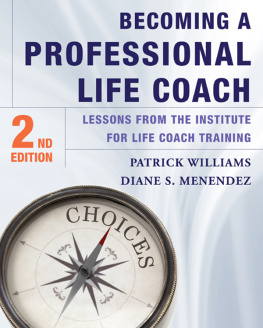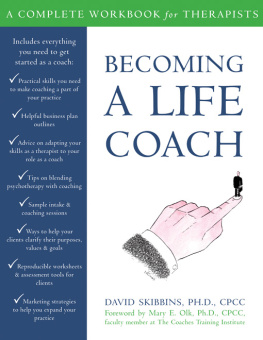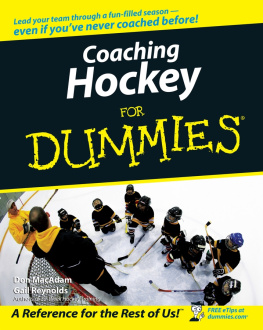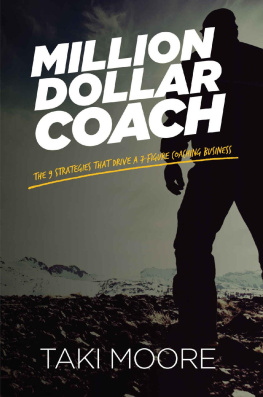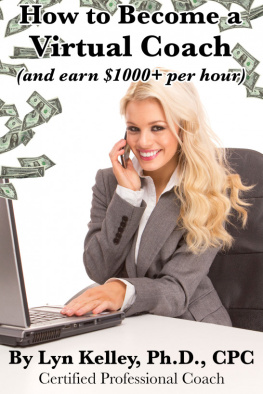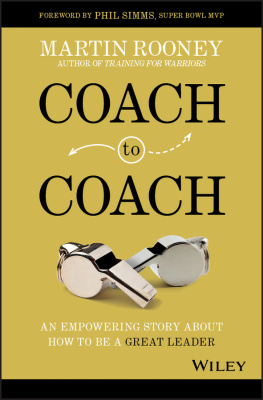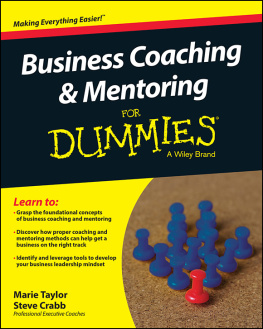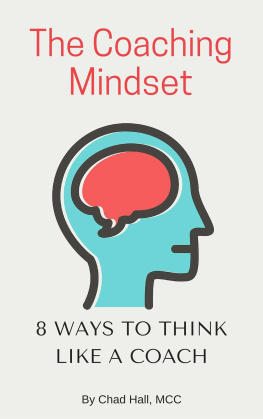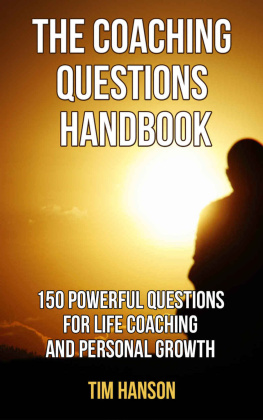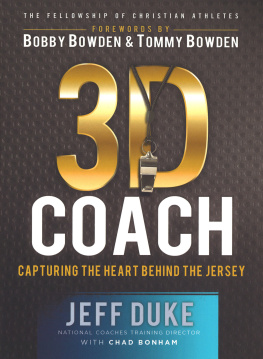
Becoming a
Professional
Life Coach
Lessons from the Institute for Life Coach Training
Second Edition
Patrick Williams and Diane S. Menendez

W. W. Norton & Company
New York London
A Norton Professional Book
This e-book contains some places that ask the reader to fill in questions or comments. Please keep pen and paper handy as you read this e-book so that you can complete the exercises within.
Copyright 2015, 2007 by Patrick Williams and Diane S. Menendez
All rights reserved
For information about permission to reproduce selections from this book,
write to Permissions, W. W. Norton & Company, Inc.,
500 Fifth Avenue, New York, NY 10110
For information about special discounts for bulk purchases, please contact
W. W. Norton Special Sales at specialsales@wwnorton.com or 800-233-4830
Book design by Paradigm Graphics
Production manager: Christine Critelli
Library of Congress Cataloging-in-Publication Data
Williams, Patrick, 1950
Becoming a professional life coach : lessons from the institute for
life coach training / Patrick Williams and Diane S. Menendez. Second edition.
pages cm
Includes bibliographical references and index.
ISBN 978-0-393-70836-3 (hardcover)
1. Personal coaching. I. Menendez, Diane Susan. II. Title.
BF637.P36W54 2015
158.3dc23
2014048364
W. W. Norton & Company, Inc.,
500 Fifth Avenue, New York, N.Y. 10110
www.wwnorton.com
W. W. Norton & Company Ltd., Castle House,
75/76 Wells Street, London W1T 3QT
CONTENTS
Coaching continues to evolve as a profession that is changing the way people get help by improving their lives and their business. I am very proud of what we have created at the Institute for Life Coach Training (ILCT) and I thank the faculty, all the students who have learned with us, and all the coaches who have helped me keep my vision alive and fun! I especially thank Diane Menendez and Sherry Lowry, who helped craft the first coaching training manual in 1998, and Diane and other facultyLynn Meinke, Jim Vuocolo, Marilyn OHearne, Doug McKinley, Lisa Kramer, Sherry Lowry, Christopher McCluskey, Judy Silverstein, and Judy Santoswho continually made rewrites and revisions. Thank you all for your professionalism and high-quality standards for both our coaching and our teaching content. I especially thank Ellen Ritter, who took over the ownership of ILCT in 2012 and continues to nurture my dream and preserve my legacy.
Patrick Williams, July 2014
I am deeply grateful to those who have given so much to me as a coach over the past 18 years. For Pat Williams and Sherry Lowry, colleagues par excellence, whose original commitment to creating a program for training coaches led to a wonderful working relationship and a great curriculum for the ILCT. For my writer-husband, Lew Moores (19502014), who encouraged me to create a real personal voice for the writing of the ILCT manual during its three revisions. For the faculty of the Gestalt Institute of Cleveland, whose programs supported me to develop my first approach to coaching in 1988. For my clients, from whom I have learned so much about the challenges of leadership and life.
Diane S. Menendez, July 2014
As the profession of professional coaching (and all its specialties) has grown globally the last many years, its evolution has and must contain a body of knowledge of evidence based competencies and ethical standards. These are necessary ingredients for a profession to be accepted and achieve its place as a true profession. To be seen as a self-regulating profession, those who aspire to be a professional coach and those who would hire them need to have a way to be relatively assured in a coachs competency through a process attaining a credential.
Coaching is not a licensed profession, although there have been a few jurisdictions that have tried to make it so. Therefore, it is currently the case that anyone may call himself or herself a coach; it is not a protected title. But that is also true for being a speaker, or consultant, trainer, or even a parent. Those who would hire professionals who do not need, nor have, a government regulated license to practice, must do their own due diligence as to the competency and reputation of the coach they may hire.
The International Coach Federation (www.CoachFederation.org), since 1995, has been the main organization of the coaching profession from the early days of the prefession, and has grown into a large global organization for membership, conferences, ethical review, and credentialing of certified coaches as well as accrediting training organizations and schools.
One must be aware that joining the ICF (for any other established organization around the globe) is by choice and it may be more for the coach than for the public. The ICF and organizations like the European Mentoring and Coaching Council, The Association of Coaching, and others serve as a place of community for its members. They serve the role of creating the standards of competency and mastery, as well as ethical guidelines and review procedures.
But of course if a coach is not a member, there is no recourse for any discipline or training and the public may be confused as to who is a qualified coach and who is not. Therefore, it is our opinion that the ICF and other organizations serve as a form of professional visibility to the public. These organizations make a compelling argument for coaches to pass minimum standards for certification and maintain the credential through continuing education and review.
There is a more recent player in the field that shows promise in creating a credential and a review process that is objective, and solely involved in assessment of competencies with a testing and credentialing procedure as other professions have. The Center for Credentialing and Education (www.CCE-global.org) created the Board Certified Coach credential in 2010 and will continue to refine testing procedures as well as the minimal standards of competency for the profession of coaching. There are also dozens of graduate schools that offer degrees and/or graduate certificates in coaching as well as coach specific research, further enhancing the body of knowledge, evidence, and credibility of this evolving profession.
All of this bodes well for a strong, international profession that is highly regarded, self-regulated, and vibrant for the years to come.
Welcome aboard.
COACHING COMPETENCIES
Below are lists of competencies from three credentialing organizations. These are good guidelines for any coach or professional who utilizes the coach approach in their business.
International Coach Federation: Core Competencies
The following eleven core coaching competencies were developed to support greater understanding about the skills and approaches used within todays coaching profession as defined by the International Coach Federation. They will also support you in calibrating the level of alignment between the coach-specific training expected and the training you have experienced.
Finally, these competencies and the ICF definition were used as the foundation for the ICF Credentialing process examination. The ICF defines coaching as partnering with clients in a thought provoking and creative process that inspires them to maximize their personal and professional potential. The Core Competencies are grouped into four clusters according to those that fit together logically based on common ways of looking at the competencies in each group. The groupings and individual competencies are not weighted they do not represent any kind of priority in that they are all core or critical for any competent coach to demonstrate.
Next page
